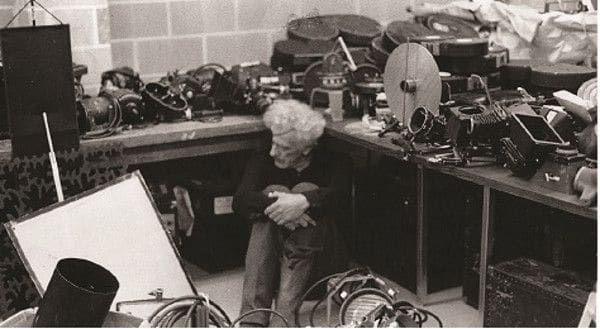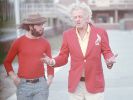Eye For Film >> Movies >> We Can't Go Home Again (1976) Film Review
We Can't Go Home Again
Reviewed by: Robert Munro

Best known for directing some excellent Fifties Hollywood movies – In A Lonely Place, Johnny Guitar, Rebel Without A Cause et al – Nicholas Ray made this experimental feature in the 1970s after Hollywood decided it was through with him, and he decided he was through with them. It is a sad end to a fine, fine career.
A disjointed and incoherent mess, the film was made by Ray and his students at a New York University where he was hired to teach cinema. Like most of the decisions made throughout his life, Ray went with his gut and taught cinema his own way. No stuffy lectures, or castrated analysis of the medium. Grab a camera. Make a film.

The students were involved in all aspects of the production of the film, everyone swapping roles as varied as acting, sound, camera, lighting and editing. Each, including Ray, plays a semi-fictionalised version of themselves in a narrative-free progression designed to reflect the shattered dreams and disillusionment felt by a Seventies generation betrayed by Vietnam and Watergate; by the Chicago riots (in which Ray lost sight in his right eye); by the assassination of JFK; in short by the American dream, dreamt for them and not by them.
The film is composed of several different pieces of film superimposed on to the same screen – a collage of film which pulls your eyes everywhere trying to find the story. Ray thought of it as a cinematic interpretation of something like Picasso’s Guernica; the screen is filled with four, sometimes five different images (even shot on different film: Super 8mm, 16mm and 32mm). Added to that there are seemingly random splashes of colour and what looks like the inverted negative obscuring an actor’s face.
Truth be told, it is annoying as hell and becomes very tired, very quickly. There a few (very brief) moments where a golden nugget of cinema shines through. Most involve seemingly honest conversations with the lost youths and their proverbial master. Most emphatic is a prolonged shot of one of the students hacking off his beard in tears. We’ve no idea why he’s hacking it off, but the emotion is genuine and the camera’s gaze (for once) unwavering.
But these moments are few and far between. For the most part it's a turgid watch, with Ray’s alcoholism and deteriorating state of mind sadly mirrored in this shambolic attempt to relive past glories or forge new boundaries. It does neither and very little of anything in between either.
Reviewed on: 23 Jun 2012

















